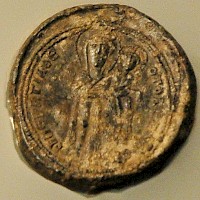Arrian's Parthica (Photius' Excerpt)
Arrian of Nicomedia (c.87 - after 145): Greek historian and senator of the Roman empire, author of several historical studies. His best-known work is the Anabasis, which deals with Alexander the Great. Arrian is the author of various other philosophical and historical texts.

On this page, you will find a Byzantine excerpt of Arrian's Parthica, made by Photius (c.815-897). He was one of the greatest scholars of the Byzantine world, and patriarch of Constantinople between 858-867 and 878-886. One of his main publications is the Myrobiblion, a collection of 280 excerpts of all kinds of literature on every possible subject. They were a present to his brother, who had not been there when Photius and his friends read those texts. Photius quotes, summarizes, and excerpts various sources: the Acts of the Councils, the stories about martyrs, but also pagan authors, which would otherwise be unknown. The excerpts and summaries are, therefore, of very great importance to modern classicists and historians.
The text of Photius' excerpt from Arrian's Parthica, which contains a very brief biography of the author, is offered here in the translation by J.H. Freese.
The Parthica
[1] Read Arrian's Parthica in seventeen books. He has also written the best account of the campaigns of Alexander of Macedonia. Another work of his is Bithynica, relating the affairs of his native country. He also wrote an Alanica.
[2] In the Parthica he gives an account of the wars between Parthia and Rome during the reign of Trajan. He considers the Parthians to have been a Scythian race, which had long been under the yoke of Macedonia, the Persians having been subdued at the same time, and revolted for the following reason.
[3] Arsaces and Tiridates were two brothers, descendants of Arsaces, the son of Phriapetes. These two brothers, with five accomplices, slew Pherecles, who had been appointed satrap of Parthia by [the Seleucid king] Antiochus Theos, to avenge an insult offered to one of them; they drove out the Macedonians, set up a government of their own, and became so powerful that they were a match for the Romans in war, and sometimes even were victorious over them.
[4] Arrian further relates that during the reign of Sesostris, king of Egypt, and Iandysus, king of Scythia, the Parthians removed from their own country, Scythia, to the land which they now inhabit. The emperor Trajan reduced them to submission but left them free under a treaty, and appointed a king over them [Parthamaspates].
[5] This Arrian, called the "young Xenophon," a philosopher and one of the pupils of Epictetus, flourished during the reigns of Hadrian, Antoninus Pius, and Marcus Aurelius. Owing to his remarkable learning he was entrusted with various offices of state, and was finally promoted to the consulship. He was also the author of other works: the Lectures of Epictetus his master, with eight books of which we are acquainted, and the Conversations of Epictetus in twelve books. His style is dry, and he is a genuine imitator of Xenophon.